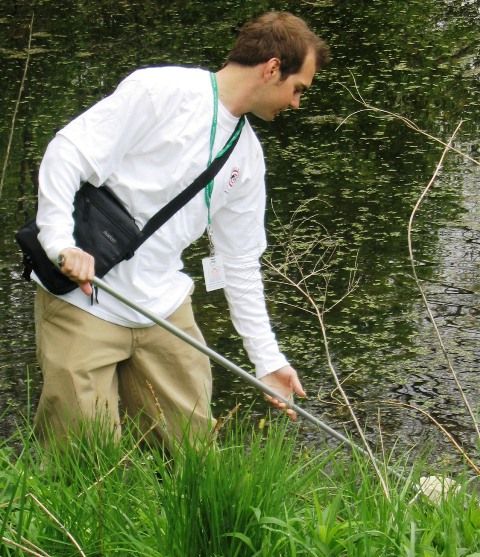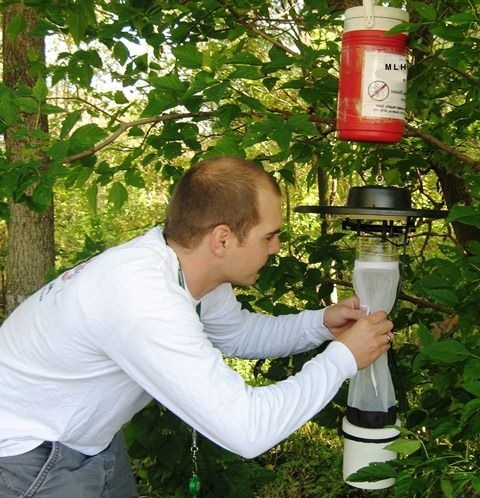Larval Mosquito Surveillance and Control
About 250 standing water sites, located on public property in Middlesex-London, are monitored seasonally on a weekly basis by Health Unit staff. Mosquito larvae (young), that begin their life cycle in standing water, are collected from these sites and identified in the Strathroy laboratory. If mosquito species that are known to carry West Nile Virus or Eastern Equine Encephalitis Virus are found, a larvicide treatment is performed on the standing water. Health Unit staff do not spray larvicide to control mosquitoes. Larvicide is applied by hand directly to standing water.
Larvicides used in standing water specifically target mosquito larvae and are applied by licensed staff. The larvicide applied by Health Unit staff contains bacteria called Bacillus thuringiensis israelensis, commonly referred to as Bti.1 The product is biologically safe and only lasts in the water for about 48 hours after it is applied. The larvicide is approved for use by the Ministry of the Environment and Climate Change and is regulated by the Pest Management Regulatory Agency.2 Larvicide treatment is used to reduce the number of mosquitoes that emerge in the environment and as a result, manage the spread of West Nile Virus and Eastern Equine Encephalitis Virus in the community. The Middlesex-London Health Unit also larvicides municipal roadside catch basins with three treatments throughout the season.
Adult Mosquito Surveillance
Adult mosquito surveillance is carried out with the use of Centers for Disease Control (CDC) light traps, baited with carbon dioxide (CO2). Trap locations are spread throughout Middlesex-London and are set up from June to September. The traps are set up overnight, and the light and carbon dioxide (CO2) attract the mosquitoes. The following day, the mosquito samples are collected, identified, and tested for both West Nile Virus and Eastern Equine Encephalitis Virus.
Adult mosquito surveillance and viral testing offer valuable information to the Middlesex London Health Unit. They provide a better understanding of:
- Where vector-borne disease activity is happening
- The different types of mosquito species that are found in an area, and
- The amount of mosquitoes that are present in an area.
What happens if West Nile Virus or Eastern Equine Encephalitis Virus is found?
The Middlesex-London Health Unit will increase its larval and adult mosquito surveillance activities if West Nile Virus or Eastern Equine Encephalitis Virus is found through:
- A positive human case, or
- A positive mosquito trap.
When positive viral activity is identified in a given area, Health Unit staff will increase larval surveillance monitoring and larvicide treatments in that area. Extra mosquito traps are then set up to collect and test additional populations of adult mosquitoes in the area.
Report a Concern or Complaint
To report a concern or complaint about mosquitoes or standing water, please call contact the Health Unit:
- 519-663-5317
- VBD@mlhu.on.ca
Health Unit staff checking standing water for mosquito larvae

Health Unit staff setting up an adult mosquito trap
